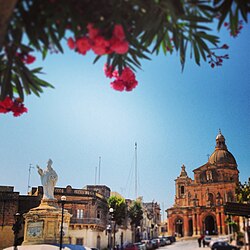Siggiewi
|
Siġġiewi Is-Siġġiewi Città Ferdinand, Siggieui |
|||
|---|---|---|---|
| City and Local council | |||

Main square of Siġġiewi
|
|||
|
|||
| Motto: Labore et Virtute (Work and Virtue) |
|||
 |
|||
| Coordinates: 35°51′15″N 14°26′18″E / 35.85417°N 14.43833°ECoordinates: 35°51′15″N 14°26′18″E / 35.85417°N 14.43833°E | |||
| Country |
|
||
| Region | Southern Region | ||
| District | Western District | ||
| Borders | Dingli, Luqa, Mqabba, Qormi, Qrendi, Rabat, Żebbuġ | ||
| Government | |||
| • Mayor | Karol Aquilina (PN) | ||
| Area | |||
| • Total | 19.9 km2 (7.7 sq mi) | ||
| Population (March 2014) | |||
| • Total | 8,367 | ||
| • Density | 420/km2 (1,100/sq mi) | ||
| Demonym(s) | Siġġiewi (m), Siġġiwija (f), Siġġiwin (pl) | ||
| Time zone | CET (UTC+1) | ||
| • Summer (DST) | CEST (UTC+2) | ||
| Postal code | SGW | ||
| Dialing code | 356 | ||
| ISO 3166 code | MT-55 | ||
| Patron saint | St. Nicholas | ||
| Day of festa | Last Sunday of June | ||
| Website | Official website | ||
Siġġiewi (Maltese: Is-Siġġiewi, [sɪdʒˈʒiːwɪ]), also called by its title Città Ferdinand, is a city and a local council in the Southern Region of Malta. It is the third largest council in Malta by surface area, after Rabat and Mellieħa respectively. It is situated on a plateau, a few kilometres away from Mdina, the ancient capital city of Malta, and 10 kilometres (6 miles) away from Valletta, the contemporary capital. It is the home of 8367 inhabitants as of March 2014.
Until several decades ago, most of the population was employed in the fields which surround the village. In 1993, the city adopted the motto Labore et Virtute (Work and Virtue).
In its demographic and topographical formation, Siġġiewi followed a pattern common to other villages in Malta. Before the arrival of the Order of St John in 1530, there were other thriving hamlets in the area. Little by little Ħal Xluq, Ħal Kbir, Ħal Niklusi and Ħal Qdieri were absorbed in Siġġiewi and today, only their secluded chapels remind us of their former existence.
The origins of the name Siggiewi are unknown. The name is unique and bears no resemblance to well-known words. "Siggiewi" may be a corruption of an old name. The areas around Siggiewi were inhabited since the Maltese islands were occupied by the first farmers during the Neolithic period. The Neolithic sites of Hagar Qim and Mnajdra (3600-2500 BC) are within walking distance of the village. Also within easy reach of the village are the Bronze Age settlement of Wardija ta’ San Gorg, almost at the southern tail end of Dingli Cliffs, and the Bronze Age cart-ruts at ix-Xaghra ta’ Ghar il-Kbir (1500-750/800 BC).
An early Phoenician tomb was located in the area, but small Phoenician/Punic cemeteries are known on the hill top of tal-Gholja and at ix-Xaghra ta’ Ghar il-kbir. In numerous places, Roman pottery scatters are often encountered, suggesting that the environs of Siggiewi were also occupied during the Roman occupation of Malta and Gozo.
...
Wikipedia


